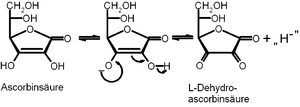
- Image via Wikipedia
Vitamin C, ascorbic acid, seems to be always in the news. Dr. Linus C. Pauling, the organic chemist who won TWO unshared Nobel Prizes (Chemistry, Peace) (he died in 1994), averred that it was critical for our health. It was to be used by us to treat heart disease, cancer, and infections. We only remember his proclamations that it would stop the common cold.
Well, the NIH got into the act. In an article published in PNAS (93, 3704-9), they reported that our blood can be saturated at low doses of ascorbic acid- and were positive that doses over 1 g were potentially dangerous. Many scientists scoffed at this study, but the Vitamin C lobby was greatly attenuated. Well, very quietly (they published but did not repudiate), NIH’s Vitamin C group determined that repeated doses of oral vitamin C (220 uM) would help treat cancer. Amazingly, this dosage is THREE TIMES the “saturated” value averred in the RDA (recommended dietary allowance)- and virtually identical to Pauling’s claims.
We used ascorbic acid in the 70’s and 80’s for dialysis. No, not to treat patients, per se; but to treat the water that was used to make dialysate that would treat the patients. To make a long story short, chlorinated water used in dialysis oxidized (hemolyzed) the patients’ blood; adding ascorbic acid to the dialysate concentrate (1.5 g packet in a jug of concentrate; 10 mg/L as delivered) destroyed the chlorine molecule and was safe for the patient, with the reaction occurring quickly enough (some 10 seconds of contact, the time it took the concentrate to mix with the water and be delivered to the patient). Hemolytic problems (except for when clinics made grievous errors, such as the Philadelphia Incident, for which we also reported in dialysis journals) became non-existent.
Now, Dr. Karel Tyml, leading a group at University of Western Ontario, has published (in a variety of journals) studies showing ascorbic acid can prevent the onset of and reverse sepsis. Sepsis is the term used for any bacterial infection in your body. (I have just – hopefully- resisted my bout with the disease). Small blood clots form, and thereby preclude blood perfusion of various vital organs, which can lead to organ failure. (Most likely candidates for the disease are babies, the elderly, and those with weakened immunity). There has been no truly effective treatment until now. Dr Tyml found the real cause (using intravital microscopy, a means to examine microcirculation in the organs) was the “plugging” of capillaries. He had found that oxidative stress led to blood clotting. (See our research above.) As such, he provided a single bolus of ascorbic acid to the mice at the onset of sepsis precluded capillary plugging. Moreover, after the plugging has started, it can be reversed by injection of ascorbic acid. The effect lasts for some 24 hours post injection. This study was done in mice; human studies need to be completed. Perhaps, since the side-effects of ascorbic injection are virtually non-existent, we should consider the immediate use of this (as part of the study) to treat wounded troops in the Middle East, where sepsis is problem, too.








Thanks man. This is interesting hearing
Thanks a million. This was nice reading
Thanks friend. This was cool hearing
Great stuff. We are always trying to be more scientific but your info on Vitamin C is some really detailed information. Thanks
James recently posted..OxyELITE Pro Info
Glad you liked the info, James. Thanks for stopping by- and please visit again, soon!
Roy
Okay.. I think I got it! It’s okay if I take my horse tablets of vitamin C? They’re like candy to me. LOL 🙂
Justice Calo Reign recently posted..Why Do We Do This To Ourselves
Ascorbic acid is one of those vitamins we can take without worry. It’s water soluble. So, if you take too much, it ends up excreted. Not true for a lot of other vitamins.
Thanks for dropping in and leaving a comment, Justice.
Roy
Most experts recommend getting vitamin C from a diet high in fruits and vegetables rather than taking all kinds of supplements.
candice michelle recently posted..fashion advice
Great advice, Candice! Thanks for bringing that fact out in the open!